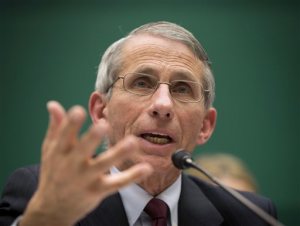
(AP) — The gulf between politicians and scientists over Ebola widened on Sunday as the top U.S. infectious-disease expert warned that the mandatory, 21-day quarantining of medical workers returning from West Africa imposed by several states is unnecessary and could discourage volunteers from going to the hot zone.
“The best way to protect us is to stop the epidemic in Africa, and we need those health care workers, so we do not want to put them in a position where it makes it very, very uncomfortable for them to even volunteer to go,” said Dr. Anthony Fauci, director of the National Institute of Allergy and Infectious Diseases.
Meanwhile, Kaci Hickox, the first nurse forcibly quarantined in New Jersey under the state’s new policy, said in a telephone interview with CNN that her isolation at a hospital was “inhumane,” adding: “We have to be very careful about letting politicians make health decisions.”
Saying the federal health guidelines are inadequate, the governors of New York and New Jersey announced a mandatory quarantine program Friday for medical workers and other arriving airline passengers who have had contact with Ebola victims in West Africa, and Illinois soon followed suit. Florida Gov. Rick Scott ordered twice-daily monitoring for 21 days of anyone returning from Ebola-stricken areas. Twenty-one days is the incubation period for Ebola.
On Sunday night, New York Gov. Andrew Cuomo revised the restrictions on his state’s quarantine program, saying health care workers will be quarantined at home and receive twice-daily monitoring from medical professionals if they have no symptoms. The state will also pay for any lost compensation, if they are not paid by a volunteer organization.
New Jersey Gov. Chris Christie on Sunday defended quarantining as necessary to protect the public and predicted it “will become a national policy sooner rather than later.”
“I don’t believe when you’re dealing with something as serious as this that we can count on a voluntary system,” said Christie, who is expected to run for the Republican nomination for president in 2016.
The Obama administration considers the policy in New York and New Jersey to be “not grounded in science” and has conveyed its concerns to Christie and Cuomo, according to a senior administration official who wasn’t authorized to comment by name and insisted on anonymity.
Fauci made the rounds on five major morning talk shows to argue that policy should be guided by science — and that science says people with the virus are not contagious until symptoms appear. And even then, infection requires direct contact with bodily fluids.
Fauci said that close monitoring of medical workers for symptoms is sufficient, and warned that forcibly separating them from others, or quarantining them, for three weeks could cripple the fight against the outbreak in West Africa — an argument that humanitarian medical organizations have also made.
The World Health Organization said more than 10,000 people have been infected with Ebola in the outbreak that came to light last March, and nearly half of them have died, mostly in Guinea, Sierra Leone and Liberia.
Earlier this month, four members of a family in Texas that Ebola victim Thomas Eric Duncan stayed with before he died were confined to their home under armed guard after failing to comply with a request not to leave their apartment. Also, 75 Dallas hospital workers were asked to sign legally binding documents in which they agreed not go to public places or use mass transit.
The New York-area quarantine measures were announced after Dr. Craig Spencer was admitted to a hospital to be treated for Ebola a week after returning to New York City from treating Ebola victims in Guinea for Doctors Without Borders. In the week after his return, he rode the subway, went bowling and ate at a restaurant.
Hospital officials said Sunday that Spencer was in serious but stable condition, was looking better than he did the day before, and tolerated well a plasma treatment from an Ebola survivor.
Hickox, the quarantined nurse, said she had no symptoms at all and tested negative for Ebola in a preliminary evaluation.
“It’s just a slippery slope, not a sound public health decision,” she said of the quarantine policy. “I want to be treated with compassion and humanity, and don’t feel I’ve been treated that way.”
Hickox now has access to a computer, her cellphone, magazines and newspapers and has been allowed to have takeout food, New Jersey Health Department officials said.
New York City Mayor Bill de Blasio called Hickox a “returning hero” and charged that she was “treated with disrespect,” as if she had done something wrong, when she was put into quarantine. He said that she was interrogated repeatedly and things were not explained well to her.
Samantha Power, the U.S. ambassador to the United Nations who arrived in Guinea on Sunday, said the new quarantine policies are “haphazard” and said returning U.S. health care workers should be “treated like conquering heroes and not stigmatized for the tremendous work that they have done.”
The New York area quarantine policies could affect U.N. staffers returning from Ebola-hit countries. Farhan Haq, deputy spokesman for U.N. Secretary-General Ban Ki-moon, said in an email “that we comply with the health policies for New York State.
Last week, Ban reiterated that “isolation only hampers international efforts to reach people in need.” A new U.N. mission to counter the Ebola outbreak has staffers in all three of the worst-hit countries in West Africa.
In other developments, President Barack Obama met Sunday with his Ebola response team, including “Ebola czar” Ron Klain and other public health and national security officials. According to a statement released by the White House, Obama said any measures concerning returning health care workers “should be crafted so as not to unnecessarily discourage those workers from serving.”
Fauci appeared on “Fox News Sunday,” ABC’s “This Week, NBC’s “Meet the Press,” CBS’ “Face the Nation” and CNN’s “State of the Union.” Christie was interviewed on Fox and Power spoke to NBC.